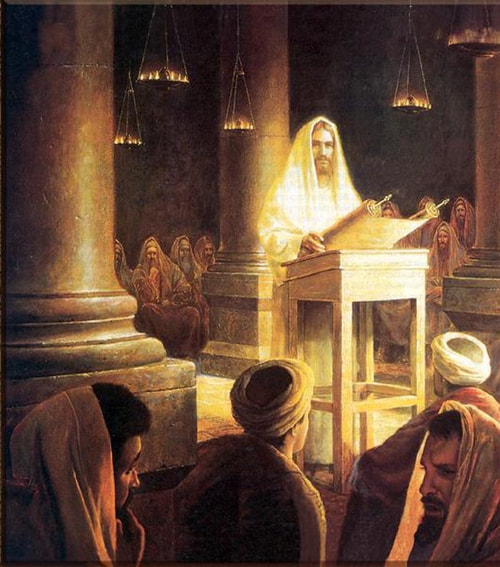Luke 4:14-30
Lesson 111
Lesson 111
Read both the "King James Bible" and the "New Living Translation."
In this lesson:
Jesus teaches in the synagogues.
As we see in verses 4:14 and 4:23, Jesus is already well known.
That's because Luke skipped Jesus' first year of ministry in Judea and began with the Galilean ministry.
To learn about Jesus' Judean ministry, see John 1:19-4:43.
Additional note; verses 4:16-27 are the oldest known record of a synagogue service.
Jesus teaches in the synagogues.
As we see in verses 4:14 and 4:23, Jesus is already well known.
That's because Luke skipped Jesus' first year of ministry in Judea and began with the Galilean ministry.
To learn about Jesus' Judean ministry, see John 1:19-4:43.
Additional note; verses 4:16-27 are the oldest known record of a synagogue service.
Jesus teaching in the synagogue.
Study Tip:
Don't forget to read the margin notes in blue and to click on the links.
Don't forget to read the margin notes in blue and to click on the links.
Where was -
Capernaum -
Capernaum was a large city on the north-west shore of the Sea of Galilee and the hometown to several disciples. Located on the main highway from Damascus to Acco and Tyre, Capernaum became a bustling center of commerce. It also boasted a thriving fishing industry. A customs station (Matthew 9:9; 17:24; Mark 2:14; Luke 5:27) and a large contingent of Roman soldiers were stationed there, and the city became known for its moral excesses. The disciple Peter owned a house in Capernaum and Jesus made it His center of operations while in Galilee (as prophesized in Isaiah 9:1-2 and discussed in Matthew 4:13-16). Because its citizens witnessed many divine miracles (Matthew 8:14-16; Mark 1:30-34; Luke 4:38-41) yet still rejected Christ, the city was denounced in Matthew 10:15,11:23 and Luke 10:15. Its ancient remains have been excavated near the town of Tell Hum. Among the ruins are the remains of a synagogue unearthed in 1905 that could be the one built by the Roman centurion who came to Jesus seeking a miracle (Matthew 8:5-8; Luke 7:1-10).
Capernaum -
Capernaum was a large city on the north-west shore of the Sea of Galilee and the hometown to several disciples. Located on the main highway from Damascus to Acco and Tyre, Capernaum became a bustling center of commerce. It also boasted a thriving fishing industry. A customs station (Matthew 9:9; 17:24; Mark 2:14; Luke 5:27) and a large contingent of Roman soldiers were stationed there, and the city became known for its moral excesses. The disciple Peter owned a house in Capernaum and Jesus made it His center of operations while in Galilee (as prophesized in Isaiah 9:1-2 and discussed in Matthew 4:13-16). Because its citizens witnessed many divine miracles (Matthew 8:14-16; Mark 1:30-34; Luke 4:38-41) yet still rejected Christ, the city was denounced in Matthew 10:15,11:23 and Luke 10:15. Its ancient remains have been excavated near the town of Tell Hum. Among the ruins are the remains of a synagogue unearthed in 1905 that could be the one built by the Roman centurion who came to Jesus seeking a miracle (Matthew 8:5-8; Luke 7:1-10).




